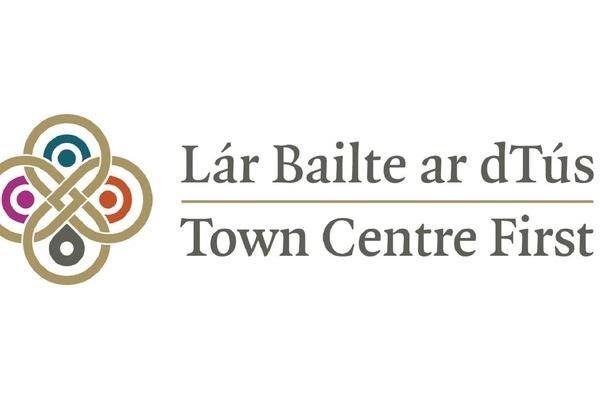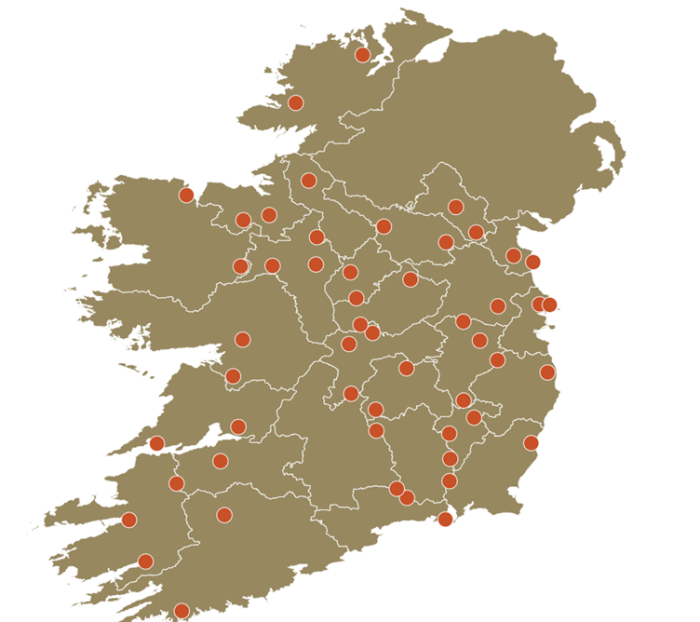
ORIGINS
The TCF’s origins lie in a pilot established by the DRCD in 2018 named Town Centre Living. The Initiative focused on exploring how to improve residential occupancy in towns and villages in rural Ireland while addressing the issue of vacant properties. Six towns across counties Kilkenny, Mayo, Monaghan, Offaly, Roscommon, and Waterford were selected to evaluate the approach, following on from which, an independent review report (published in June 2020) was conducted by Space Engagers, a social enterprise which explores how to make towns and cities more resilient and sustainable. The review included information on the implementation of the pilot in each of the six towns, workshop summaries, emerging issues, and it also identified fifteen actions for consideration by the Department, following on from which, the Irish Government committed to developing a Town Centre First policy.
Context:
In the two decades between the mid-1990 and mid-2010s, the population in towns around Ireland increased by 62%. While primarily driven by population growth in commuting towns around the country’s five major cities, this contrasts vastly with the increase in population inside cities and suburbs of only 23%. A trend of urban development has taken place outside the cities and more traditional larger towns. Ireland’s more rural areas, towns and cities are connected and interdependent. Following the 2016 Census, 29% of the country’s population was living in towns with varying degrees of independence from the main cities. An additional 29% of the population were in rural areas with both a population of less than 1500 persons with either a moderate or high urban influence, depending on the work location for these residents. This meant some 58% of the population lived in towns with between 1,500 and 50,000 people or else in a nearby area with a moderate or high urban influence. This speaks to the importance of our town centres on the very lives and wellbeing of almost 3 in 5 people in the state.
Vacancy and even dereliction has become more noticeable in our towns, impacting the energy of town centres and a loss of some of their historic character and attractiveness. Re-using and regenerating these buildings can be transformative and a boost to the capacity and promise of smaller towns around the land, cognisant of the need to potentially identify and develop new roles and functions, the improvement of infrastructure and amenities, or perhaps even a greater focus on services or hospitality and social interaction. However, economic challenges to town centres exist both because of and beyond the loss of vitality and attractiveness due to vacancy and dereliction. Employment opportunities are impacted by out-of-town and online shopping and the closing down of some services which have become unviable. The hollowing out of our towns has been caused by a drift away from both town centre living and commercial activity. The development of homes on the edge of towns, but closer distance to the urban centres, has been at the expense of the core town centre itself, leaving it to seem more like a commercial centre. In some cases, the very shops, services and employment that might otherwise have been traditionally found in the town centre are now located on the edge of town. In some instances, due to inadequate infrastructure and connectivity for pedestrians and cyclists, it can even lead to a car dependency within the town.
As Ireland’s population grows, and towns adapt to the new commercial environment in which they find themselves, questions have been focussed on the need for town centre living (and not just on the edge of towns), with real and tangible economic, social and environmental benefits that could be realised. There is a perception that green field sites on the edge of town give a greater return on investment, especially so when existing services and environmental impacts are not to the fore in the economic investment decision. Furthermore, it can be a challenge to both encourage and enable people live in town centres, and the financial cost in adequately adapting older buildings to more modern living demands such as gardens and parking.
The COVID-19 pandemic further highlighted the importance of optimal standards in public realm, streets, parks and amenities for towns and communities to enjoy recreation and socialise around Ireland. These are important quality of life considerations for citizens of all ages, abilities and socioeconomic backgrounds. As well as catering for their own locals, ensuring the heritage of character, identity and pride, towns must also cater for visitor and tourists. In addition to this, and despite towns remaining an important site of work and enterprise, this landscape was further altered somewhat due to the opportunities presented by remote working.
The TCF Approach:
A national framework underpins the TCF approach. This includes a network of Town Regeneration Officers (TROs) who bring a coordinated approach to delivery across the state and in sharing best practice; better data collection to better understand towns across the land and establish an evidence base for TCF as it evolves; a Town Audit Programme to build and expand on the Heritage Council’s Collaborative Town Centre Health Check model; the development of capacity building programmes for Town Teams to best enable them deliver in an impactful way; a National Town Centre First Office to drive the implementation of TCF actions and to co-ordinate stakeholder engagement both nationally and across the Local Government Sector; and a Cross-Government focus and alignment through a National Oversights and Advisory Group (NOAG) that monitors and guides the delivery of TCF. More detail is provided below on the highlighted structures of the TCF approach.
Each individual TRO is part of a wider national network of TROs that support knowledge development and sharing good practice across the state. Based in the Local Authority (LA), the role of the TRO in each county is to act as a key conduit between the LA and the Town Team. They guide the Team in delivering the TCF Policy, via support in capacity building and in developing and delivering on the TCF Plan (more below), as well as in locating and accessing potential funding sources. Town Teams consist of representatives of local business, residents, youth, community and voluntary groups, and other stakeholders as identified in each locality. They represent a diversity of sectors and backgrounds, are essentially “local experts” on their area and take a lead on developing interventions that can make positive long-term changes for their town.
The National Town Centre First Office is a principal avenue for coordinating engagement between stakeholders on TCF and feeding into developing a wider national policy around town centre regeneration. The Office is a dedicated resource set up to drive the delivery of TCF policy, including among other actions, supporting the National TCF network to ensure consistency and best practice in the roll out of the TCF policy; developing a national Toolkit to help implement the TCF Policy by identifying a range of best practices and other resources (as recorded on the TCF website); establishing improved data sources, defined measurement requirements and research around cost benefit analyses of actions; with the Office also producing an Annual Implementation Plan to guide the national level delivery as well as monitoring of same through regular Progress Reports.
The delivery of TCF is monitored and guided by a National Oversight and Advisory Group (NOAG). It provides a shared space for engagement across both national stakeholders and Government Departments. It also sees the Local Government sector join with agencies in support of towns, alongside other sectoral, business and community representatives, as well as experts. The National Town Centre First Office is both guided by and gives updates to the NOAG.
Another key feature of the TCF approach is the development of a TCF Plan in each locality. TCF plans are guided by first establishing a clear analysis of existing strengths and challenges at the local level. In December 2021, Minister Heather Humphreys (DRCD) announced that €2.6m in funding was available to a total of twenty-six towns to develop TCF Plans as part of phase 1 of the policy. The towns in question were chosen by their parent local authority (of which there are a total of thirty-one in Ireland) before being approved by the Minister. All twenty-six plans in the pilot initiative were completed. Readers can access more information on the completed plans via the TCF website.
These first ever TCF plans were Launched in February 2022. Helping to enable local communities and businesses alongside their relevant Local Authority to make the most of their unique strengths and assets, each plan is centred on collaboration and communication, bringing together the most pertinent local stakeholders; understanding the place, including analysis and appraisal reinforced by the Collaborative Town Centre Health Check process. The empirical baseline will allow monitoring and development of the town centre via land use surveys, retailer surveys, pedestrian counts and digital town blueprints to name a few; defining the place by centring the plan on high-level objectives with a matched number of actions; and enabling the place by identifying a path to Plan delivery with clear actions of different scales to be delivered by the various local partners; and funding such as the Urban Regeneration and Development Fund; Rural Regeneration and Development Fund; and the European Regional Development Fund, among others.
In 2024, the DRCD announced a new Suite of Supports worth €4.56m for further investment in towns throughout Ireland. A range of measures will be supported by this investment with each measure having its distinct eligibility criteria, therefore seeing more than one town per county targeted (see spread below). The Suite will help ensure an effective allocation of supports at the local level, enabling communities and their Town Teams to deliver their revitalisation objectives.

Town Centre First locations
The new package includes supporting the following measures:
- Town Team Support Fund: up to €10k each for three towns to support the Team’s development or to establish a Team (if not yet in existence).
- Town Centre First Plan: funding of €30k will be available to help the development of a Town Centre First plan in a rural town.
- Project Development Measure: this initiative will help Local Authorities to contribute to a channel of substantial, well-developed projects by providing €50k in support to two projects with a third extra sum of €50k for the Northern and Western part of Ireland (a region in transition).
The TCF journey continues, with the model providing a concrete path forward for Irish towns to ensure they stay central and function impactfully for their everyday users. The suite of supports available help ensure Irish towns of all sizes continue to serve their local community's needs and alongside this, to be vibrant and attractive locations in which to live, work and visit
